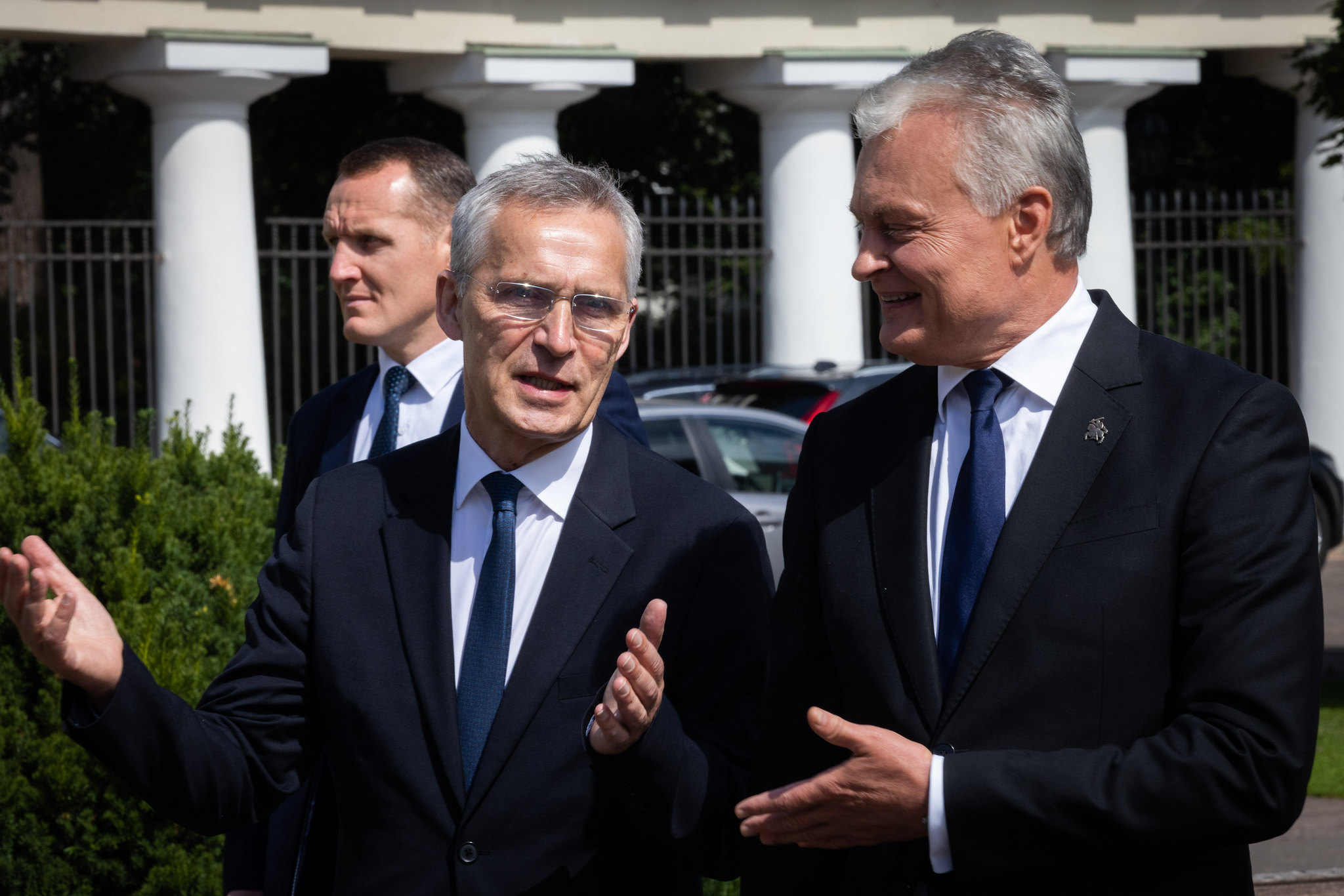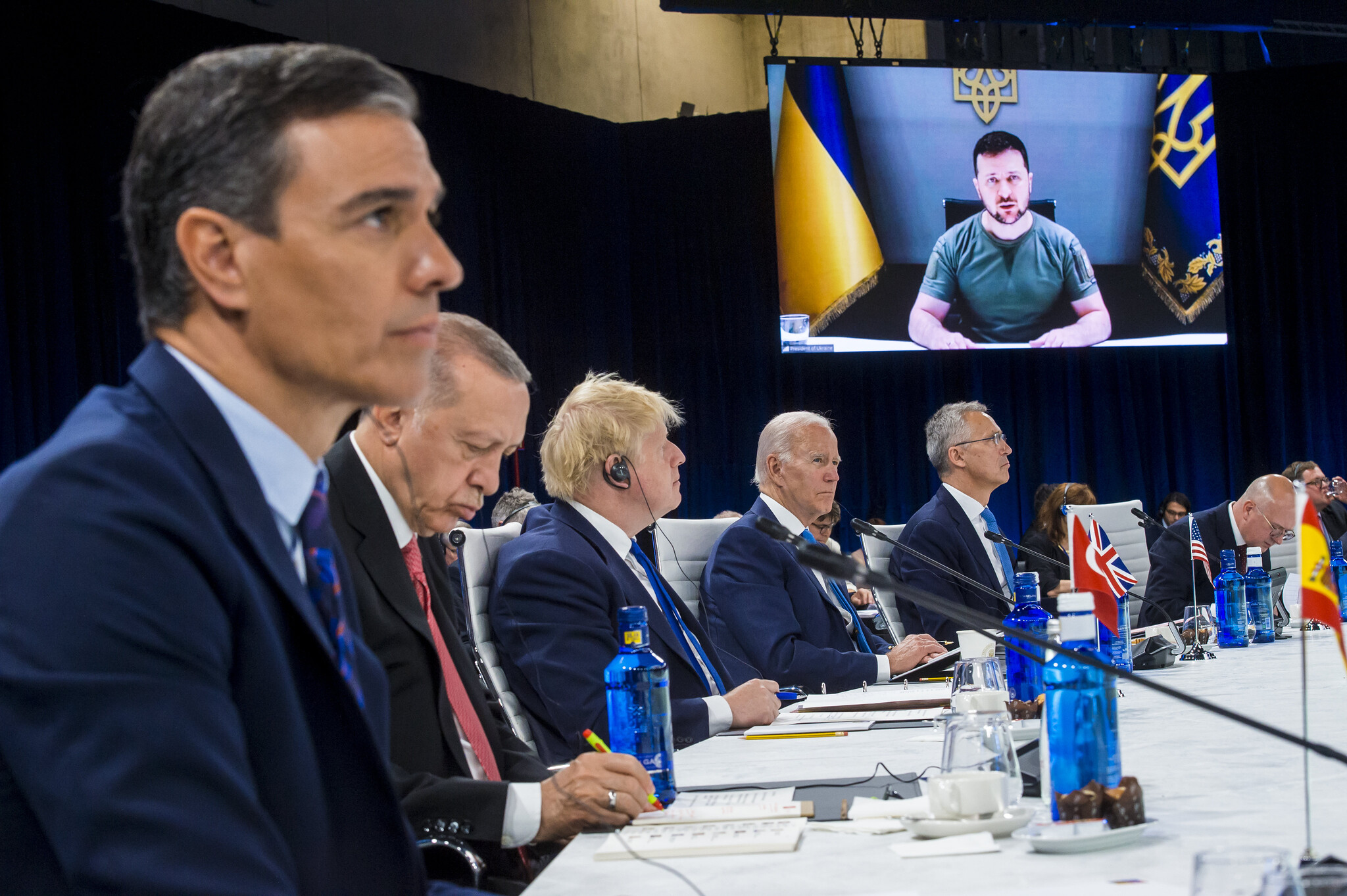The unfulfilled goals and objectives from last year’s meeting in Madrid loom over the Atlantic military alliance. When the membership meets in Vilnius this week, normalizing failure might best describe the most that can be accomplished.

NATO Secretary General Jens Stoltenberg and Lithuanian President Gitanas Nauseda, on June 26. (NATO)
By Scott Ritter
Special to Consortium News
 The leaders of NATO’s 31 constituent member states have begun to assemble in Vilnius, the capital of Lithuania, for the alliance’s 33rd summit, an event that has come to symbolize the military organization’s increasingly difficult task of transforming political will into tangible reality.
The leaders of NATO’s 31 constituent member states have begun to assemble in Vilnius, the capital of Lithuania, for the alliance’s 33rd summit, an event that has come to symbolize the military organization’s increasingly difficult task of transforming political will into tangible reality.
Since the Wales Summit of 2014, when NATO made Russia a top priority in the aftermath of the Russian annexation of Crimea, and the Warsaw Summit of 2016, when NATO agreed to deploy “battlegroups” on the soil of four NATO members (Latvia, Estonia, Lithuania and Poland) in response to perceived Russian “aggression” in the region, Russia has dominated the NATO agenda and, by extension, its identity.
The Vilnius summit promises to be no different in this regard.
One of the major issues confronting the NATO leadership is that the Vilnius summit operates under the shadow of last year’s Madrid summit, convened in late June in the aftermath of Russia’s initiation of military operations against Ukraine.
The Madrid summit came on the heels of Boris Johnson’s deliberate sabotage of a Ukrainian-Russian peace agreement that was supposed to be signed on April 1, 2023, in Istanbul, and the decision by the United States in May 2023 to extend to Ukraine military assistance exceeding $45 billion as part of a new “lend lease” agreement.
[Related: The Failed Ukrainian Peace Deal]
In short, NATO had opted out of a peaceful resolution to the Russia-Ukraine conflict and instead chose to wage war by proxy — with Ukrainian manpower being married with NATO equipment — designed to achieve what U.S. Ambassador to NATO Julianne Smith, in May 2022, called the “strategic defeat” of Russia in Ukraine.
The Madrid summit generated an official NATO statement which declared that “Russia must immediately stop this war and withdraw from Ukraine,” adding that “Belarus must end its complicity in this war.”
When it came to Ukraine, the Madrid statement was equally firm. “We stand in full solidarity with the government and the people of Ukraine in the heroic defense of their country,” it read.
“We reiterate our unwavering support for Ukraine’s independence, sovereignty, and territorial integrity within its internationally recognized borders extending to its territorial waters. We fully support Ukraine’s inherent right to self-defense and to choose its own security arrangements. We welcome efforts of all Allies engaged in providing support to Ukraine. We will assist them adequately, recognizing their specific situation.”
Confidently Seeking a ‘Strategic Defeat’

Ukraine’s President Volodymyr Zelensky joins NATO meeting in Madrid in June 2022 via video link. From left at table: Spain’s Prime Minister Pedro Sánchez, Turkey’s President Recep Tayyip Erdogan; Boris Johnson, then U.K. prime minister, U.S. President Joe Biden and NATO Secretary General Jens Stoltenberg. (President of Ukraine)
NATO, it seemed, was supremely confident in its ability to achieve the outcome it so very much wanted — the strategic defeat of Russia.
What a difference a year makes.
NATO assistance to Ukraine resulted in a successful counteroffensive which compelled Russia to withdraw from territory around the city of Kharkov, as well as abandon portions of the Kherson Oblast located on the right bank of the Dnieper River. Once the Russian defenses solidified and the Ukrainian attack stalled, NATO and Russia both began preparing for the next phase of the conflict.
NATO began a months-long effort to equip and train nine Ukrainian army brigades to NATO standards by providing them with NATO tanks, armored vehicles, artillery and training them in NATO-style combined arms warfare.
For its part, Russia conducted a partial mobilization of both its manpower (calling up some 300,000 reservists while recruiting an additional 150-200,000 volunteers) and its defense industry (dramatically increasing its production of tanks, missiles and artillery ammunition). Moreover, Russia prepared hardened defensive positions in accordance with a military doctrine that had been updated to consider the lessons of the first year of the Special Military Operation in Ukraine.
NATO had placed high hopes on the Ukrainian army being able to carry out a counteroffensive against Russia which would achieve discernable results both in terms of territory re-captured and casualties inflicted on the Russian army. The results, however, have been dismal to date — tens of thousands of Ukrainian casualties and thousands of destroyed vehicles while failing to breach even the first line of the Russian defenses.
One of the challenges NATO will face in Vilnius is the question of how to recover from this setback. Many NATO countries are starting to exhibit “Ukraine fatigue” as they see their armories stripped bare and their coffers emptied in what, by every measurement, appears to be a losing cause.
The scope and scale of the Ukrainian military defeat is such that the focus of many NATO members appears to be shifting from the unrealistic goal of strategically defeating Russia to a more realistic objective of bringing about a cessation to the conflict that preserves Ukraine as a viable nation state.
Ukrainian President Volodymyr Zelensky will attend the NATO summit. However, his demands for NATO membership will not be met — U.S. President Joe Biden himself has weighed in on the matter, saying this would not be possible while Ukraine is at war with Russia.
Face-Saving Gestures
There will be face-saving gestures from NATO, such as the creation of a NATO-Ukraine Council and talk of eventual post-conflict security guarantees. But the reality is Zelensky’s presence will do Ukraine more harm than good, since it will only accentuate the internal disagreement within NATO on the issue of Ukrainian membership and highlight NATO’s impotence when it comes to doing anything that can meaningfully alter the current trajectory on the battlefield, which is heading toward a strategic defeat for both Ukraine and NATO.
The vision of the Madrid summit was that of NATO capitalizing on its strategic victory against Russia to further expand its ranks in Europe (both Finland and Sweden were invited), and to push its influence into the Pacific Ocean. While NATO’s Pacific partners (Australia, New Zealand, Japan and South Korea) have been invited to Vilnius, the hopes that their presence would coincide with the announcement of the opening of a NATO liaison office in Japan have been quashed by France, which objects to an alliance ostensibly focused on North Atlantic security becoming involved in the Pacific.
While Finland has joined NATO, Sweden has not, and its membership is becoming increasingly problematic given Turkey’s opposition. Turkish President Recep Erdogan’s recent announcement that Turkey will agree to Swedish NATO membership when the European Union admits Turkey appears to be a poison pill that permanently scutters Sweden’s membership hopes, since the European Union is not inclined to admit Turkey.
The Vilnius summit will most likely be defined by these issues, and by the inability of the alliance to reach a meaningful consensus on how best to address them.
One can expect a plethora of rhetorical spin and posturing by the NATO membership, but the fact is the real mission of the Vilnius summit is how best to achieve a soft landing from the unfulfilled goals and objectives laid out last year in Madrid.
Normalizing failure might best describe the best that NATO can accomplish in Vilnius.
Any failure to try to stop the accumulation of debacles that represent the current NATO policy toward Ukraine will result in further collapse of the military situation in Ukraine, and the political situation in Europe, which, in their totality, push NATO closer to the moment of its ultimate demise.
This prospect does not bode well for those whose task it is to put as positive a spin as possible on reality. But NATO has long ago stopped dealing with a fact-based world, allowing itself to devolve into a theater of the absurd where actors fool themselves into believing the tale they are spinning, while the audience stares in dismay.
Scott Ritter is a former U.S. Marine Corps intelligence officer who served in the former Soviet Union implementing arms control treaties, in the Persian Gulf during Operation Desert Storm and in Iraq overseeing the disarmament of WMD. His most recent book is Disarmament in the Time of Perestroika, published by Clarity Press.
The views expressed are solely those of the author and may or may not reflect those of Consortium News.


That is why all empires eventually face the war they are trying to avoid, for “believing the tale they are spinning”.
It is extremely courageous of the few who can yell out “the king has no clothes”
Don’t see NATO membership for a country with an ongoing 9 year civil war on its own citizens that is led by the Azov / Right Sector. Western Ukrainians Don’t want peace with the Russian-speaking Eastern side. They want them dead. Ukraine’s lines will be redrawn. After a ceasefire.
Well said
The way the U.S. and Ukraine are acting, there will not be a ceasefire until Russian troops are at the Polish border!
I bet my SSgt neighbor $100 that we would be in volved in another war within a year of leaving Afghanistan – I won. The MIC must be fed.
They were the instigators of this conflict and even in defeat, with so much of NATO’s munitions depleted they will be making billions for at least a decade.
Very sad but oh so true!
Great piece. The US NATO ambassador in May 2022 may have exposed the West’s big lie of ‘defending democracy’ in Ukraine when she called for the ‘strategic defeat’ of Russia but Canada’s foreign minister Melanie Joly did it sooner. In February 2022 she told CTV News ‘our goal is to suffocate the Russian regime.’
Our Capitalism rewards failure, duh. Just help keep the profitable chaos going. Mismanaging this or that event but being able to “man the front counter”, talk to a camera, ‘splain things away, ride out the storm, reassure the peasants, etc. gets these politics players promoted as they aid the 1% financial elite. Good players see their status quo gain more and more status. Only a moral upgrade will save us.
Oh and now the good ‘ole USA will be sending cluster bombs to Ukraine!
I wonder if any member of NATO, any member, will raise the question of whether NATO’s current actions and proposals are consistent with section 7 of the NATO Charter, which affirms clearly NATO’s commitment to the UN Charter and the Security Council.
We really don’t know what Turkey was offered but something was done. Something made Erdogan to release the Azov prisoners which was an utter violation of the Turkish obligation to Russia.
Why should failure in Ukraine lead to the demise of Nato?
Chances are that Nato will push for even more weapons to strengthen the alliance. What will bring Nato down is political change in Europe and/or the US.
In Europe, the transatlantic elite has been firmly entrenched in politics and the media since WWII. Most people can’t even imagine a world without their “friends” on the other side of the big pond. The only thing that can cure Europe of this deadly addiction is a deep economic crisis that will trigger a public uprising and throw out the whole establishment. But nobody knows what creatures will emerge in the wake of such a crisis. The global elite may well resort to fascism once more. The problem here is that Europe may never recover from such a crisis. In other words, the Ukraine war has triggered Europe’s terminal decline.
The Soviet Union was dissolved from the center (due to Gorbachev’s reforms) and not from the periphery. Many communist leaders of the Warsaw pact opposed Gorbachev’s reforms because they knew that it would be the end of the socialist experiment.
Likewise, the US empire can only be collapsed from the Center and not from the periphery in Europe. A non-establishment figure at the WH standing up against the Deep State may do the trick. I think RFK Jr. doesn’t stand a chance. That leaves us with Trump if he can manage to stay out of prison.
“…where actors fool themselves into believing the tale they are spinning, while the audience stares in dismay.”
…..and increasingly contemplates the likelihood of WW3 and nuclear annihilation..all to preserve the Washington Empire…
“a Ukrainian-Russian peace agreement that was supposed to be signed on April 1, 2023, in Istanbul…”
I believe the peace talks in Istanbul took place in the spring of 2022, shortly after Russia’s invasion of Ukraine. If they had been successful tens, perhaps hundreds, of thousands of lives could have been saved. The terms offered by Russia may turn out to be more advantageous for Ukraine than those of the ultimate truce.
The terms offered in the March 2022 peace proposal were almost certainly more favorable to Ukraine than what the ultimate settlement will be. In the 15 months since Boris Johnson/Biden Administration scuttled the proposal, Ukraine has continued to go downhill both economically and militarily. And from the economic standpoint Ukraine began the war in very bad condition. I truly don’t understand why the people of Ukraine don’t put up greater resistance to the continuation of the war, especially more resistance by men age 18 to 60 since they are bearing most of the burden. I would think that by now there are no 17 year old boys left in Ukraine. Even with widespread suppression of accurate news about the war, surely social media informs these teen boys what their future is if they remain in country.
Think it was Chris Hedges who said something like ‘myths are impervious to facts’. The US/NATO/UkroNazis cabal clearly believe in their own myths. Seems this debacle really will go to the last Ukrainian. Lindsey Graham must be so proud.
The collapse of NATO can’t come soon enough for the benefit of humanity. The sooner, the better.
I agree completely. Paul Keating of Australia is right on, and notice how many slaves of NATO have come out screaming about what he said.
I’m absolutely with you. NATO should never have come into being anyway after the fall of the soviet union.? It was used as an excuse by USUK colonists to gain control over Europe and set themselves up to take over Russia with the help of their Nazi trained army in Germany and Poland, which sad for them didn’t work, and will be the direct result of their own downfall leading to world peace.??
“Recep Tayyip Erdo?an agreed to set aside his veto following last-ditch talks on the eve of the Nato summit in Vilnius, Lithuania”
I wonder what changed his mind. What was offered? No matter; as the heading states, it’s absurd. And even more absurd is the apparent deterioration of the collective state of the NATO allies: France is aflame, Spain is in a political turmoil, Netherlands government collapsed, Germany in recession, USA president has to be propped up by the King of England.
What a disgrace. And they all insist on this continual delusion.
100% true !!!
It’s a mad world, my masters.
The world will be a better place with the demise of NATO. While what Mr. Ritter says is true, he mentions not the elephant in the room. The American demand for global hegemony.
Oh, I think Scott is well aware of that elephant, Jeff.